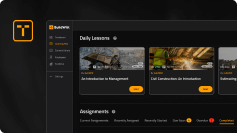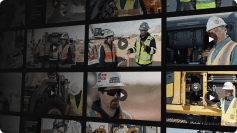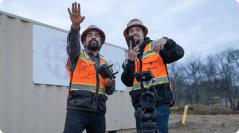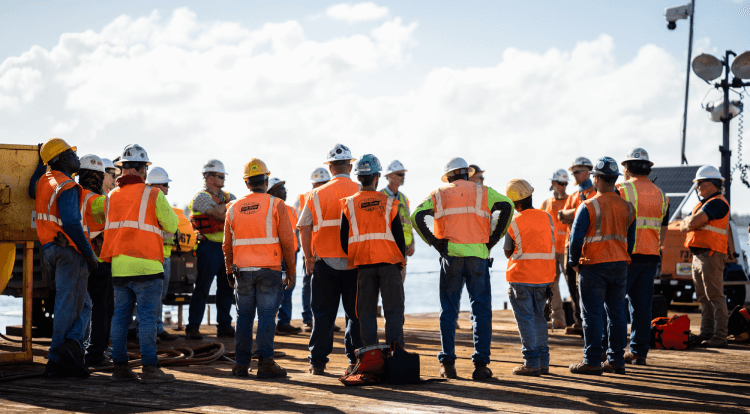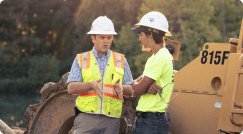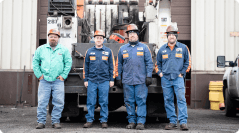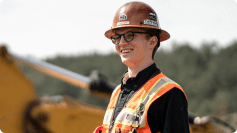10 Things to Know Before You Work in the Dirt World
Written by Megan Hamilton
May 17, 2023
Before you take the first step onto a jobsite, it’s smart to know what you’re getting into.
To help with that, we’ll walk you through 10 things you should know before you start working in the Dirt World:
1. Your why
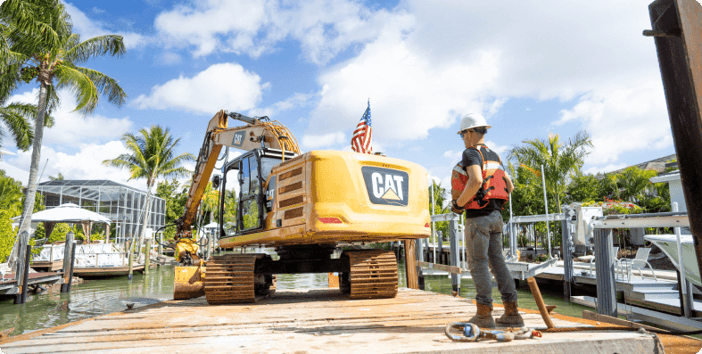 Your why is your driving force. It’s the reason you’ll get up every morning, go to the jobsite, and work hard.
Your why is your driving force. It’s the reason you’ll get up every morning, go to the jobsite, and work hard.
Maybe you just need to make some money. Maybe you’re looking for a challenge or following a family member’s footsteps. Maybe you’re passionate about the industry, people, machines, or doing work that benefits society.
People who work in the Dirt World have told us their why. Check out what they said and click their name to read their story:
I take pride in my work, the lifelong friends I've made, and my family legacy. William Kullman
I’ve wanted to be in construction since I was a little kid. Michael Burns
Every day, I get to work on incredible projects with some of the best men and women who help reshape the state my family calls home. James Kelly
The daily challenges, both mental and physical, drive my crew and me forward. Matt Karwat
I married into an excavating business, [and] I love the empowerment and camaraderie of being in this industry as a woman! Donna LaFata
I got into construction to make money [and now] I like the feeling I get knowing I take part in projects that build the foundation for society. Mitch Spence
I saw the machines running around and fell in love. Dave Frank
I get to get outside and see the fruits of my (and my teams') labor. Eric Vechan
I'm constantly learning and passing on what I learn. Ashton Lavaring
I needed a job after moving. I discovered a great interest in [safety] and educating field employees. Amanda Bowen
2. What companies want
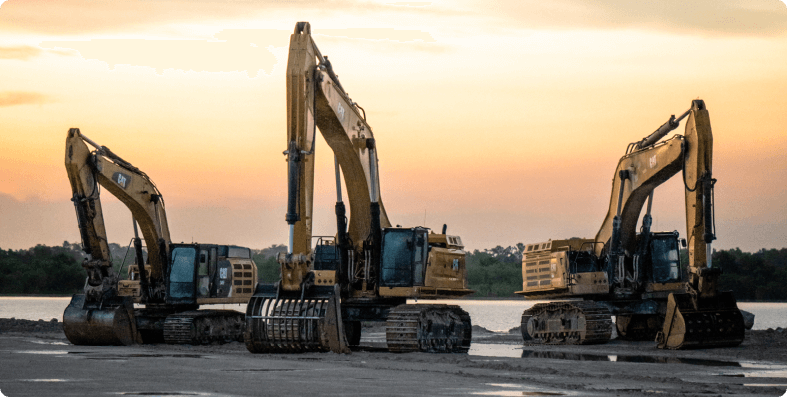
Basically, companies want someone hungry, humble, and smart. These concepts come from Patrick Lencioni’s book, The Ideal Team Player.
- A hungry person works hard and wants to learn everything they can.
- A humble person knows they have room to grow, and they strive to improve. They admit and fix their mistakes without blaming others.
- A smart person works well with others. They value people and communicate clearly.
Another way to know if you’re what companies are looking for?
A wise cowboy named Dewayne Noel once said, “Ask yourself honestly, if you were running the business would you hire you? And if your answer is ‘I’m not sure that I would,’ then become the you that you would hire.”
3. Starting at the bottom
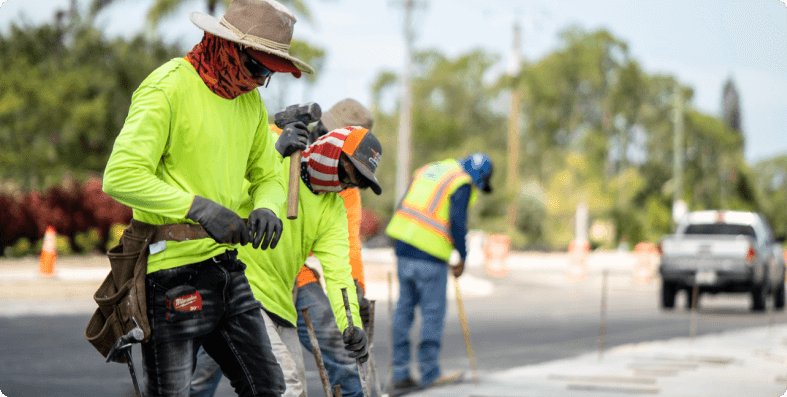 Almost everyone starts in an entry level position—like haul truck driver or laborer—for their first couple years.
Almost everyone starts in an entry level position—like haul truck driver or laborer—for their first couple years.
Even if you have a college degree, you’ll probably start in a junior position working under someone more experienced, and you’ll have to earn your crew’s respect.
That’s okay. In fact, it’s an incredible opportunity. Entry level roles put you in the perfect position to get your hands into many parts of the project. That’ll help you figure out where you want your career to go.
You’ll also work alongside people with tons of experience, so ask questions. You’ll be amazed at how much they’ll teach you.
4. How to prepare for the workday
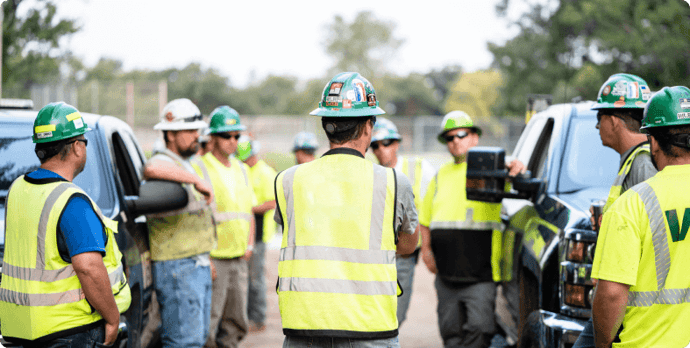 Preparation is a sign of wisdom and the start of a long, successful career. It begins with how you start your day, what you wear, and what you bring to the jobsite.
Preparation is a sign of wisdom and the start of a long, successful career. It begins with how you start your day, what you wear, and what you bring to the jobsite.
How to start your day
Your morning routine doesn’t have to be a drawn-out process. But you shouldn’t just roll out of bed and grab some coffee on your way out the door, either.
Working in the Dirt World can be physically and mentally intense, so it’s important to prepare accordingly. Some ways to do that include:
- Exercising to energize yourself and get amped for the day
- Stretching (sounds weird, but it’ll help you bend, twist, reach, and lift on the job)
- Eating a good, healthy breakfast to fuel your body
- Meditating to prepare your mind
- Making a plan and visualizing how you want to handle a task or work relationship
- Spending a little quality time with your spouse (we all need connection!)
What to wear
Most Dirt work happens outside. If you wear the wrong thing, you’ll be in for a long, miserable day. In the field, always wear:
- Comfortable, waterproof boots with a safety toe. They should also support your ankles for stability on uneven terrain.
- Layers. Don’t just dress for the weather right now. Dress in layers so you’ll be comfortable all day.
- Hi-vis clothing. Whether you wear a bright orange vest or a neon yellow shirt, you have to be easily visible so you don’t get run over.
- Hard hat. Always remember your hard hat. (On the off chance hard hats aren’t required, wear a regular hat to shield yourself from the sun.)
- Other personal protective equipment (PPE) like gloves, earplugs, and safety glasses. PPE can save you from losing a finger, going deaf, or getting blinded. Wear it. Period.
Office workers won’t need to dress for the great outdoors. But you will need to dress like a professional, because you are one! So no gym clothes, old T-shirts, or sexually suggestive clothing. You want to make a good impression on your team and your clients by dressing to look as competent and capable as you are.
What to bring
You can’t just leave a jobsite to run home and grab something you forgot. Take these things to every job in every season:
- PPE
- Water and electrolytes (like Gatorade) to stay hydrated
- Lunch
- Snacks you can carry in your pockets
- Any odds-and-ends you want in your pocket or vehicle, like a knife, pencil, sunscreen, or bug spray
5. Your responsibility when it comes to safety
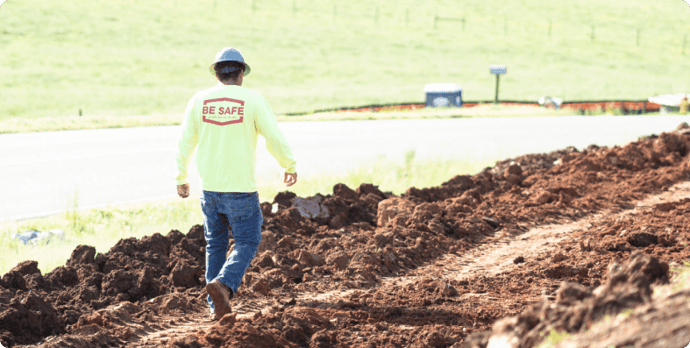 Jobsites are chaotic, with machines and trucks moving around, shovels swinging through the air, and holes in the ground.
Jobsites are chaotic, with machines and trucks moving around, shovels swinging through the air, and holes in the ground.
You have to keep your head on a swivel at all times to watch for safety hazards.
Pay close attention to your safety training. Ask your foreman about safety protocols and procedures when you have questions.
And watch out for your crewmates, because safety is everyone’s responsibility.
Help people lift heavy things so they don’t strain their backs. Learn proper hand signals so you can help operators and truck drivers get into position safely.
Finally, if you see a safety issue, speak up. It doesn’t matter that you’re the newest person on the job. If someone could get hurt or killed, you have to say something. Lives depend on it!
6. You must take initiative
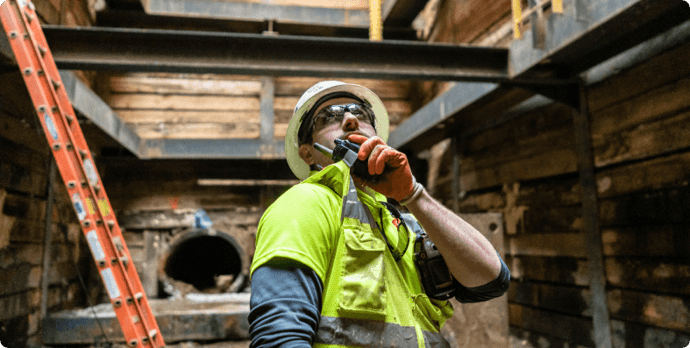 People in the Dirt World take great pride in their work ethic, and they’ll expect the same from you.
People in the Dirt World take great pride in their work ethic, and they’ll expect the same from you.
Now, your bosses and crewmates will help you learn how to do your job well, and they’ll help you grow in your career. But nobody will hold your hand. Nobody will hand you anything—especially not a promotion.
It’s up to you to take initiative. You have to show people that you have the drive to succeed in this industry. Four ways to do that are:
- Ask good questions about the task, project, people, and industry.
- Pay attention to the answers—don’t make people repeat themselves.
- Tell your bosses about your career aspirations, and ask what you need to do to get there. Then do it.
- Ask an experienced crew member to mentor you.
7. The people are different than you think
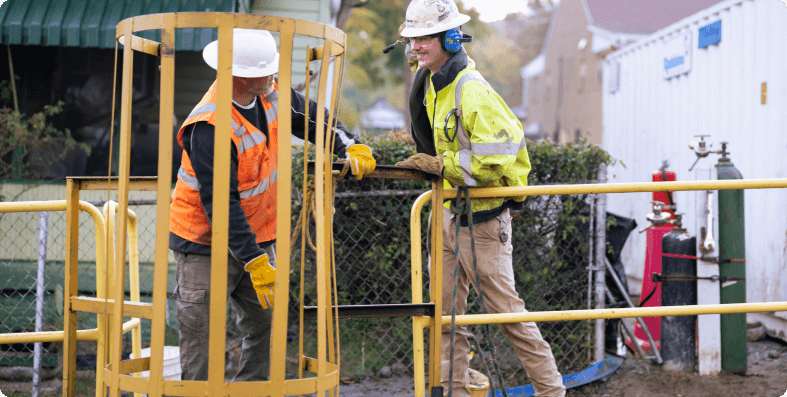 There are a lot of unflattering stereotypes of blue-collar workers. (Think Mr. Morelli from the movie City Slickers—a fat, foul-mouthed, flannel-wearing guy with his butt crack hanging out.)
There are a lot of unflattering stereotypes of blue-collar workers. (Think Mr. Morelli from the movie City Slickers—a fat, foul-mouthed, flannel-wearing guy with his butt crack hanging out.)
That is so far from the truth.
Remember the why’s we discussed earlier. People work in the Dirt World because they care about their families and communities. They care about building a better world for our society and a better future for the next generation.
Now don’t get us wrong, there are definitely gruff, old school guys out there. But they still care.
Nearly all people in the Dirt World are deeply invested in others and their work—and they want you to help uphold that quality. They’re far more willing to teach you than you might expect. And they’re some of the humblest people you’ll ever meet.
8. The work is different than you think
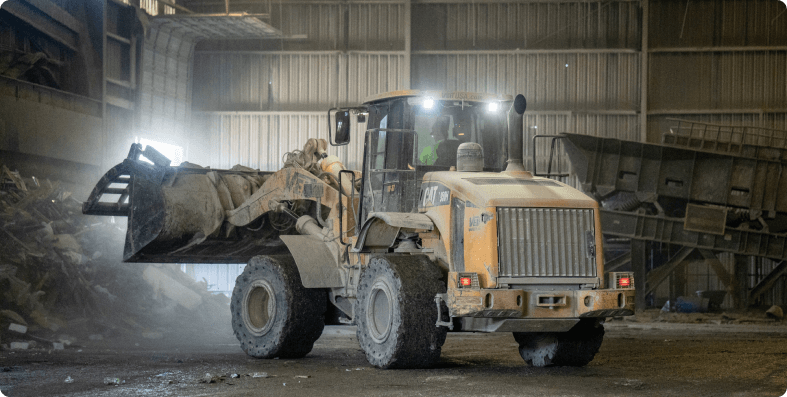 Eric Jumper has worked in the Dirt World since he was 12 years old, and he’s now our Field Operations Specialist here at BuildWitt. So we’re going to let him take this one:
Eric Jumper has worked in the Dirt World since he was 12 years old, and he’s now our Field Operations Specialist here at BuildWitt. So we’re going to let him take this one:
People get scared of Dirt stuff because they don't have a full understanding of what it is, and they still think of the 1800s coal miner. They think they’re going to be shoveling every day and working really hard.
But very rarely did I have a super hard day at work where I was absolutely beat at the end of the day. There’s a lot of hard work out there, but technology and equipment advances have changed the game.
So if you’re coming into this industry and you’re scared of your body being broken because you’re working 100 hours a week—that does exist, but that’s down to probably like 20% of the industry.
That’s a benefit people only realize when they come in. They do their first week and they’re like, ‘Oh that wasn’t so bad.’
You’re still going to work hard, it still takes a toll on your body, but the nature of the work is way different than what you think it is.
9. Your path forward
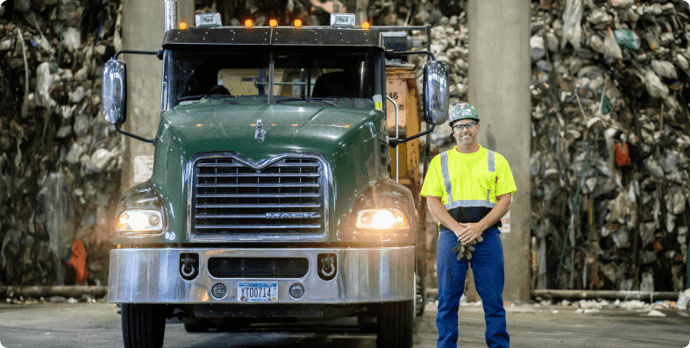 Maybe you already know where you want to go in your Dirt career. Or maybe you’re not even sure what your options are.
Maybe you already know where you want to go in your Dirt career. Or maybe you’re not even sure what your options are.
Either way, you need to uncover your path forward and make a plan to get there.
For instance, if you start as a laborer but you want to become an operator, how do you plan to do that? Have you communicated it to your supervisor and jointly developed a plan to get there? Do they have the tools to help you learn along the way so you will be prepared when the time comes?
Or if you’re not sure what you want to do, have you talked with your supervisor about what jobs are available? Will they let you try different roles to gain experience and see what you like best? Can they help you determine which roles fit your abilities and interests?
To see how others have grown in their role and tried multiple Dirt jobs, check out these stories from Brandon Benedetti, John Woolston, and Brittany Loveday.
10. You are your only limiting factor
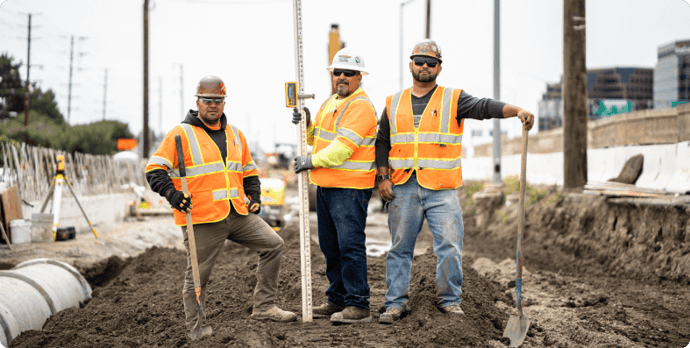 One of the coolest things about the Dirt World is that anyone can succeed there.
One of the coolest things about the Dirt World is that anyone can succeed there.
As owner Kate Holden says, “It's really the only industry in which you can have a 40+ year veteran who barely has a high school education, and that person can easily be the sharpest, most intelligent person on the job.”
They may even own the business!
The only thing that can limit your success in this industry is you.
You decide what you become. You make it happen (or not) based on your choices and actions.
You may be working in Dirt, but the sky’s the limit!
Discover more about working in the Dirt World
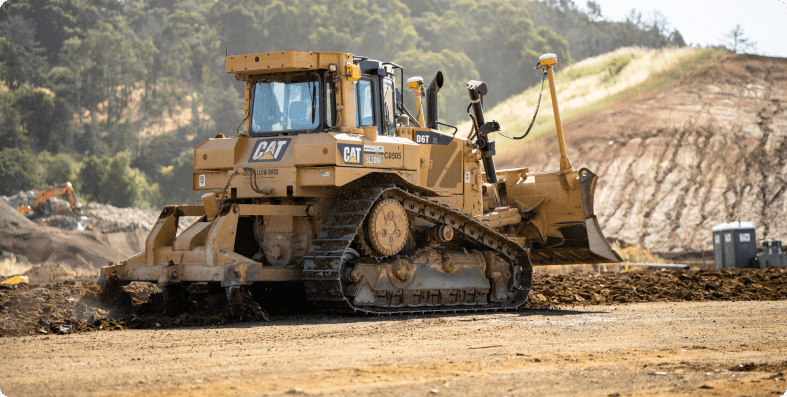 Read Your Questions About Working in the Dirt World Answered.
Read Your Questions About Working in the Dirt World Answered.
Or, head over to BuildWitt Jobs. You’ll be able to:
- Create a free profile
- Browse job openings with some great companies to work for
- Upload your resume so employers can find you

